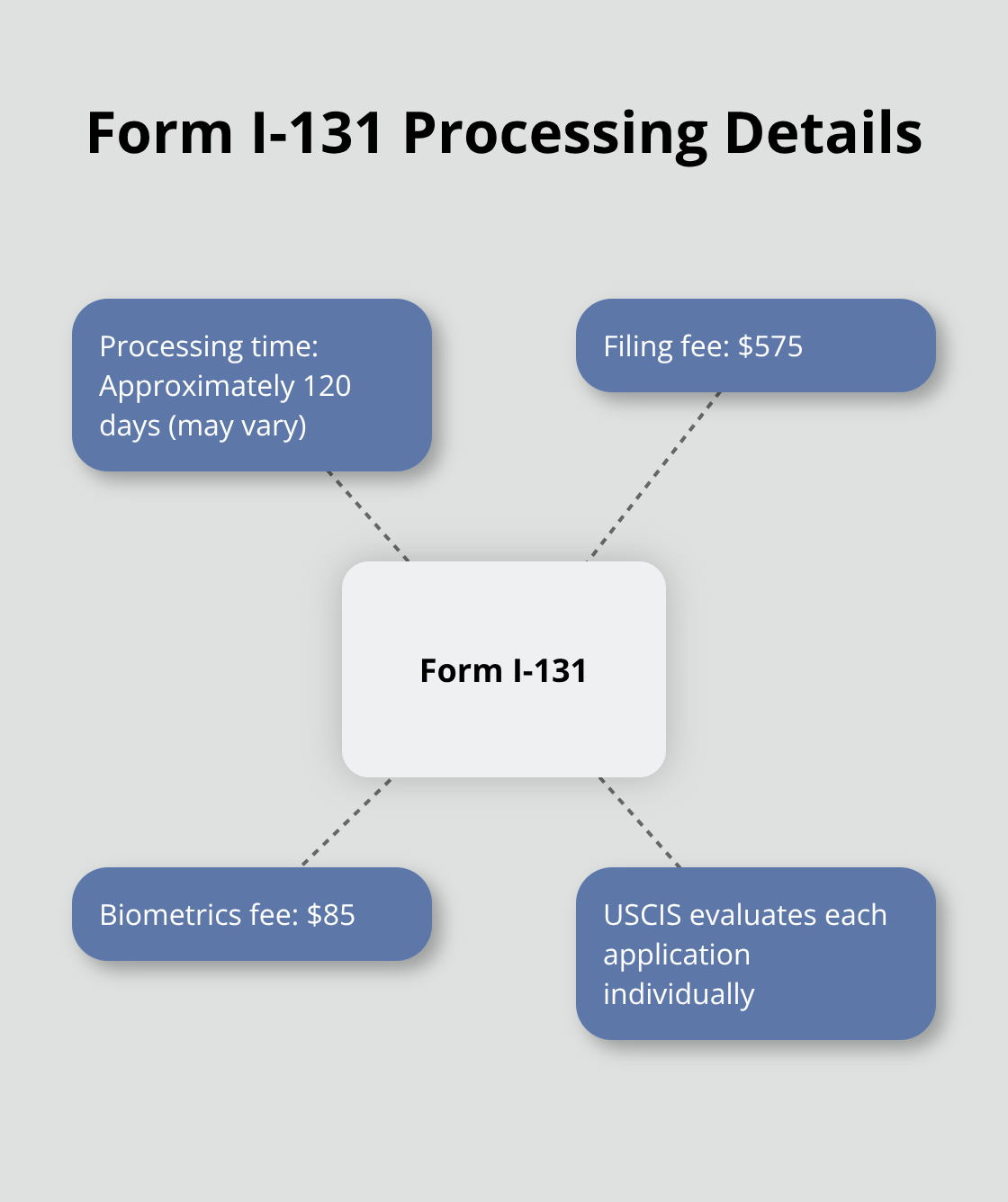
How to Use DACA Advance Parole for Adjustment of Status
DACA recipients often face challenges when it comes to travel and adjusting their immigration status. At Law Offices of Jeffrey A. Thompson, we understand the complexities of DACA Advance Parole and its potential for adjustment of status.
This guide will walk you through the process of using DACA Advance Parole to travel and potentially adjust your status upon return. We’ll cover eligibility requirements, application procedures, and the steps to take after re-entering the U.S.
Understanding DACA Advance Parole
What is DACA Advance Parole?
DACA Advance Parole is a vital tool for eligible DACA recipients. It permits them to travel outside the United States for humanitarian reasons, education, or employment and return legally. This process can create opportunities for DACA recipients, potentially leading to adjustments in their immigration status.
The Purpose of DACA Advance Parole
DACA Advance Parole fulfills two primary functions. It allows DACA recipients to travel abroad for educational, employment, or humanitarian reasons. Additionally (and perhaps more significantly), it provides a legal entry into the United States upon return. This legal entry can play a pivotal role in future immigration processes, including status adjustment.
Eligibility for DACA Advance Parole
Not all DACA recipients qualify for Advance Parole. To be eligible, you must:

USCIS thoroughly examines Advance Parole applications. They search for compelling reasons for travel that align with their guidelines. Even minor details in the application can determine its success or failure.
Benefits of Using Advance Parole
Advance Parole offers several significant advantages for DACA recipients:
- Legal Re-entry: You’ll receive a passport stamp indicating lawful entry upon return (this can be essential for future immigration processes).
- Potential Green Card Path: Some DACA recipients may become eligible for status adjustment after traveling on Advance Parole.
- Family Reunification: It enables DACA recipients to visit family members abroad, often for the first time in years.
- Career Growth: Travel for work or study can unlock new opportunities and experiences.
Risks and Considerations
While the benefits are substantial, Advance Parole is not without risks. Customs and Border Protection (CBP) officers have discretion in allowing re-entry, even with a valid Advance Parole document. Individual immigration officers can pick and choose who to send to secondary inspection.
It’s crucial to assess individual circumstances thoroughly before applying for Advance Parole. The potential benefits are significant, but so are the risks. This decision requires careful consideration and expert legal guidance.
As we move forward, we’ll explore the process of obtaining DACA Advance Parole, including the necessary forms, documentation, and timelines involved.
How to Apply for DACA Advance Parole
Completing Form I-131
The first step to obtain DACA Advance Parole requires you to file Form I-131, Application for Travel Document. You can find this form on the USCIS website. Accurate completion is essential, as errors can cause delays or denials. We recommend you review every entry multiple times.
Pay close attention to Part 4 of Form I-131, which asks for your travel reason. Provide specific and compelling evidence to support your request. USCIS announced that certain individuals requesting parole based on urgent humanitarian reasons or significant public benefit may be eligible for consideration.
Required Supporting Documents
Your application must include several supporting documents along with Form I-131:
- A copy of your DACA approval notice
- Two passport-style photos
- A copy of your government-issued ID
- Evidence supporting your reason for travel
The evidence you provide plays a critical role in your application’s success. For educational purposes, include acceptance letters, course schedules, or research proposals. Employment-related travel might require a letter from your employer explaining the necessity of your trip. Humanitarian reasons often involve medical records or death certificates of family members.
Processing Times and Fees
As of September 2025, USCIS processes Form I-131 in approximately 120 days (though this can vary). We suggest you apply at least six months before your intended travel date to account for potential delays.
The current filing fee for Form I-131 is $575, plus an $85 biometrics fee. (These fees may change, so always check the USCIS website for the most up-to-date information.) It’s important to note that paying the fee doesn’t guarantee approval. USCIS evaluates each application individually, considering factors like your immigration history and the strength of your evidence.

Potential Risks and Considerations
While Advance Parole can open doors for DACA recipients, it’s not without risks. U.S. Customs and Border Protection (CBP) officers have the power to deny reentry. This makes international travel extremely risky for DACA recipients.
You must assess your individual circumstances thoroughly before you apply for Advance Parole. The potential benefits are significant, but so are the risks. This decision requires careful consideration and expert legal guidance.
As you prepare your DACA Advance Parole application, the next crucial step involves understanding how to use this document for adjustment of status upon your return to the United States. Let’s explore this process in the next section.
How DACA Recipients Can Use Advance Parole for Status Adjustment
Re-entering the U.S. with Advance Parole
DACA recipients who return to the U.S. with Advance Parole must prepare thoroughly. Carry your original Advance Parole document, valid passport, and DACA approval notice. Expect extensive questioning by Customs and Border Protection (CBP) officers. The inspection process can last several hours, so plan accordingly.
A 2023 report by the American Immigration Council states that 98% of DACA recipients who traveled on Advance Parole successfully re-entered the U.S. However, re-entry is not guaranteed. CBP officers have the authority to allow or deny entry, even with valid documentation.
Evaluating Eligibility for Status Adjustment
After re-entering the U.S. using Advance Parole, you may qualify to adjust your status. This process involves transitioning from DACA to lawful permanent resident status (green card holder). Eligibility depends on several factors:
- Lawful entry: Your re-entry with Advance Parole may fulfill the lawful entry requirement.
- Qualifying relationship: You must have a qualifying family relationship or an employment-based petition.
- Admissibility: You must be admissible to the U.S. or eligible for a waiver of inadmissibility.
- Visa availability: For family-based petitions, an immigrant visa must be immediately available.
A study by the Center for American Progress found that about 22% of DACA recipients who traveled on Advance Parole adjusted their status to lawful permanent residency. This highlights both the potential and limitations of this strategy.

Submitting Form I-485 for Status Adjustment
If you meet the eligibility requirements, the next step involves filing Form I-485, Application to Register Permanent Residence or Adjust Status. This process requires meticulous attention to detail:
- Collect required documents: These include birth certificates, marriage certificates (if applicable), police clearances, and medical examination results.
- Complete Form I-485: Answer all questions accurately and thoroughly. Inconsistencies or omissions can cause delays or denials.
- Pay filing fees: As of September 2025, the filing fee for Form I-485 is $1,140, plus an $85 biometrics fee. (Fee waivers may be available for eligible applicants.)
- Submit supporting evidence: This includes proof of your lawful entry with Advance Parole, evidence of your qualifying relationship, and documentation of continuous residence in the U.S.
Navigating the Complexities
The journey from DACA to lawful permanent residency is not straightforward. Each case is unique, and outcomes can vary widely based on individual circumstances. While Advance Parole can serve as a powerful tool for DACA recipients, approach this process with caution and informed decision-making.
Expert legal guidance can significantly increase the chances of a successful adjustment of status application. Try to consult with an experienced immigration attorney who can assess your specific situation and guide you through the complexities of the process.
Final Thoughts
DACA Advance Parole offers a potential pathway for eligible recipients to adjust their immigration status. This process can open doors to new opportunities and provide a means for DACA recipients to pursue their American dreams. The benefits include the possibility of lawful permanent residency and the chance to visit family members abroad.
Professional legal guidance proves essential when navigating the complexities of DACA Advance Parole and the subsequent adjustment of status process. An experienced immigration attorney can assess individual eligibility, prepare a strong application, and guide applicants through potential challenges. The impact of successfully using DACA Advance Parole for adjustment of status can be life-changing, providing a path to more stable immigration status and expanded employment opportunities.
At Law Offices of Jeffrey A. Thompson, we understand the nuances of immigration law and its profound impact on individuals’ lives. Our team provides expert guidance and support throughout the DACA Advance Parole and adjustment of status process. We work to help our clients navigate these complex procedures, always striving for the best possible outcomes.


